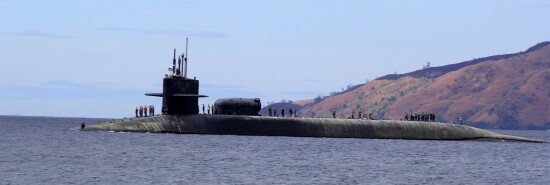
Iran is not threatened by US submarine announcement
Tom Rogan
U.S.-Iran tensions continue to escalate following Hamas‘s Oct. 7 attack on Israel. That said, Iran will not fear the Pentagon’s announcement on Sunday that a guided-missile submarine is moving toward its border. To fear that submarine, Iran must first believe the U.S. is seriously considering using it in combat.
The distinction matters greatly.
Too many have hyperventilated following the Pentagon’s announcement. Claiming the submarine announcement was extremely rare, some journalists ignored the fact that the U.S. had announced the same submarine’s port call to Norway in September. That announcement was a message to Russia just as this announcement is a message to Iran. But what really matters here is that Iran is not currently concerned by the USS Florida’s deployment.
Consider Iran’s escalating attacks on U.S. military forces. On Monday, the Pentagon said that there had been 38 separate attacks on U.S. forces in Iraq and Syria over the weekend. Forty-six U.S. personnel were lightly to moderately wounded in those attacks by Iranian proxies and deniable fronts for the Islamic Revolutionary Guard Corps. These attacks clearly underline Supreme Leader Ayatollah Ali Khamenei’s desire to make the U.S. pay for its support for Israel.
ISRAEL’S GROUND OFFENSIVE IN GAZA SEEKS TO THREAD A VERY THIN NEEDLE
So, yes, the USS Florida can sit 100 miles off the Iranian coast and still be able to hit Tehran with 154 Tomahawk missiles. Yes, Air Force fighter-bomber squadrons, two carrier strike groups, destroyers, cruisers, a Marine expeditionary unit, and an undisclosed number of attack submarines are also deployed with an eye on Iran (a U.S. nuclear ballistic submarine is also likely deployed in the Indian Ocean). But the fact that Iran is escalating rather than restraining its attacks tells us something: The supreme leader believes he has not yet found the sweet spot between causing maximal harm to the U.S. and avoiding excessively harmful U.S. retaliation.
We know this sweet spot exists in Iran’s strategic considerations. If not, Khamenei would already have directed Hezbollah to open a scaled rather than tentative second front against Israel. He might also have already employed Iran’s ballistic missile forces against Israel.
Still, it’s not surprising that Khamenei feels more American blood can forge the way to the eventual sweet spot. Biden has fostered Iran’s desire to escalate by launching only highly limited retaliatory strikes against the IRGC over the past few weeks. Those retaliatory strikes were visibly designed to avoid Iranian casualties. Khamenei and his IRGC operational commander for these activities, Quds Force leader Gen. Esmail Qaani thus infer that they can up their aggression with relative impunity. Moreover, they will also have been encouraged by the Biden administration’s broader appeasement of their aggression. Since entering office, after all, Biden has given Iran a hostage swap bonus of $6 billion and he has tolerated relentless Iranian assassination plots against top current and former U.S. officials.
In sum, both the U.S. and Iran have an interest in avoiding a descent into full-scale conflict. But it’s going to take more than submarine tweets to deter Iran from pushing the line.
